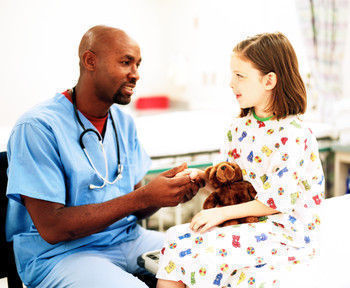Doc Holiday suggests which medical essentials to pack and how to gain access to quality health care away from home if the need arises.
Doctor In Your Pocket
Plan Ahead. For a healthier vacation, I recommend you bring along your child's immunization records, details of any longstanding medical conditions, and medication and/or food allergies.
Pack a kit with useful and sometimes hard-to-find products. These include acetaminophen (Tylenol), Ibuprofen (Motrin, Advil), an antihistamine (anti-allergy, i.e. Benadryl), decongestant (Sudafed), children's sunscreen (kids 6 months +), and insect repellent (4 years +).
If illness strikes far from home, call a locally-recommended doctor first for trauma, fractures, lacerations, sore throat/fever, strep throat, or ear pain. These problems should be tended to and treated locally, not long distance.
Call your Regular Pediatrician when you need a second opinion (to verify appropriateness of therapy prescribed by a local doctor), to ascertain the need for a local doctor's visit, or to seek basic medical advice.
Find a Local Doctor by asking your regular pediatrician to provide names or by contacting the International Society of Travel Medicine (770/736-7060) for their free directory of 1,200 members in 53 countries.
Is There A Doctor In The House?
Here are a few other sources for a local (out of town) doctor referral.
- Hotel concierge, who may recommend the hotel's medical office.
- Your nation's Embassy (or consulate).
- Local ER/Children's Hospital.
- Local families, friends, or relatives with children.
- American Express Travel Services (free to members)
In North America, your hotel will probably refer you to a local medical clinic or "walk-in" center which will provide basic medical care, First Aid, and laceration repair. When at all possible, be sure to seek treatment for your child from a pediatrician, general practitioner or family physician.
Abroad, English-speaking doctors can be recommended by your hotel or consulate. In deluxe hotels in foreign language countries, you can expect to find a Medical Office with an English-speaking nurse who will provide good basic advice, First Aid, and if needed, a physician referral.
Sign up for InRoomMD (866/909-7666), a Travel Healthcare Concierge Program available in cities across the United States that offers "house calls" for travelers. Enroll in the "BeWell Program" at least 72 hours before your departure for services such as 24-hour-a-day medical consultations, in-room treatments and emergency dental care. If you do not enroll in the program, but need medical treatment, InRoomMD offers the "GetWell Program," which provides medical services for a fee. Pricing and details are available on their website.
When You Return provide any important information to your regular pediatrician. Get copies of Lab reports (blood test & culture results) and X-rays, and relate any unusual allergic reactions, or the need for follow-up care (repeat throat/urine cultures, repeat blood work, or ear re-checks) so your child's file will be complete.
Dear Reader: This page may contain affiliate links which may earn a commission if you click through and make a purchase. Our independent journalism is not influenced by any advertiser or commercial initiative unless it is clearly marked as sponsored content. As travel products change, please be sure to reconfirm all details and stay up to date with current events to ensure a safe and successful trip.

